- Home
- Quizzes
- My Quiz Activity
- Newsletters
- Sports Betting
- MY FAVORITES
- Add Sports/Teams
- SPORTS
-
NFL
- NFL Home
- Arizona Cardinals
- Atlanta Falcons
- Baltimore Ravens
- Buffalo Bills
- Carolina Panthers
- Chicago Bears
- Cincinnati Bengals
- Cleveland Browns
- Dallas Cowboys
- Denver Broncos
- Detroit Lions
- Green Bay Packers
- Houston Texans
- Indianapolis Colts
- Jacksonville Jaguars
- Kansas City Chiefs
- Las Vegas Raiders
- Los Angeles Chargers
- Los Angeles Rams
- Miami Dolphins
- Minnesota Vikings
- New England Patriots
- New Orleans Saints
- New York Jets
- New York Giants
- Philadelphia Eagles
- Pittsburgh Steelers
- San Francisco 49ers
- Seattle Seahawks
- Tampa Bay Buccaneers
- Tennessee Titans
- Washington Commanders
-
MLB
- MLB Home
- Arizona Diamondbacks
- Atlanta Braves
- Baltimore Orioles
- Boston Red Sox
- Chicago White Sox
- Chicago Cubs
- Cincinnati Reds
- Cleveland Guardians
- Colorado Rockies
- Detroit Tigers
- Houston Astros
- Kansas City Royals
- Los Angeles Angels
- Los Angeles Dodgers
- Miami Marlins
- Milwaukee Brewers
- Minnesota Twins
- New York Yankees
- New York Mets
- Oakland Athletics
- Philadelphia Phillies
- Pittsburgh Pirates
- San Diego Padres
- San Francisco Giants
- Seattle Mariners
- St. Louis Cardinals
- Tampa Bay Rays
- Texas Rangers
- Toronto Blue Jays
- Washington Nationals
-
NBA
- NBA Home
- Atlanta Hawks
- Boston Celtics
- Brooklyn Nets
- Charlotte Hornets
- Chicago Bulls
- Cleveland Cavaliers
- Dallas Mavericks
- Denver Nuggets
- Detroit Pistons
- Golden State Warriors
- Houston Rockets
- Indiana Pacers
- Los Angeles Clippers
- Los Angeles Lakers
- Memphis Grizzlies
- Miami Heat
- Milwaukee Bucks
- Minnesota Timberwolves
- New Orleans Pelicans
- New York Knicks
- Oklahoma City Thunder
- Orlando Magic
- Philadelphia 76ers
- Phoenix Suns
- Portland Trail Blazers
- Sacramento Kings
- San Antonio Spurs
- Toronto Raptors
- Utah Jazz
- Washington Wizards
-
NHL
- NHL Home
- Anaheim Ducks
- Arizona Coyotes
- Boston Bruins
- Buffalo Sabres
- Calgary Flames
- Carolina Hurricanes
- Chicago Blackhawks
- Colorado Avalanche
- Columbus Blue Jackets
- Dallas Stars
- Detroit Red Wings
- Edmonton Oilers
- Florida Panthers
- Los Angeles Kings
- Minnesota Wild
- Montreal Canadiens
- Nashville Predators
- New Jersey Devils
- New York Islanders
- New York Rangers
- Ottawa Senators
- Philadelphia Flyers
- Pittsburgh Penguins
- San Jose Sharks
- Seattle Kraken
- St. Louis Blues
- Tampa Bay Lightning
- Toronto Maple Leafs
- Vancouver Canucks
- Vegas Golden Knights
- Washington Capitals
- Winnipeg Jets
- NCAAF
- NCAAM
- Boxing
- Entertainment
- Lifestyle
- Golf
- MMA
- Soccer
- Tennis
- Wrestling
- More Sports
- RESOURCES
- My Account
- YB on Facebook
- YB on Twitter
- YB on Flipboard
- Contact Us
- Privacy Policy
- Terms of Service
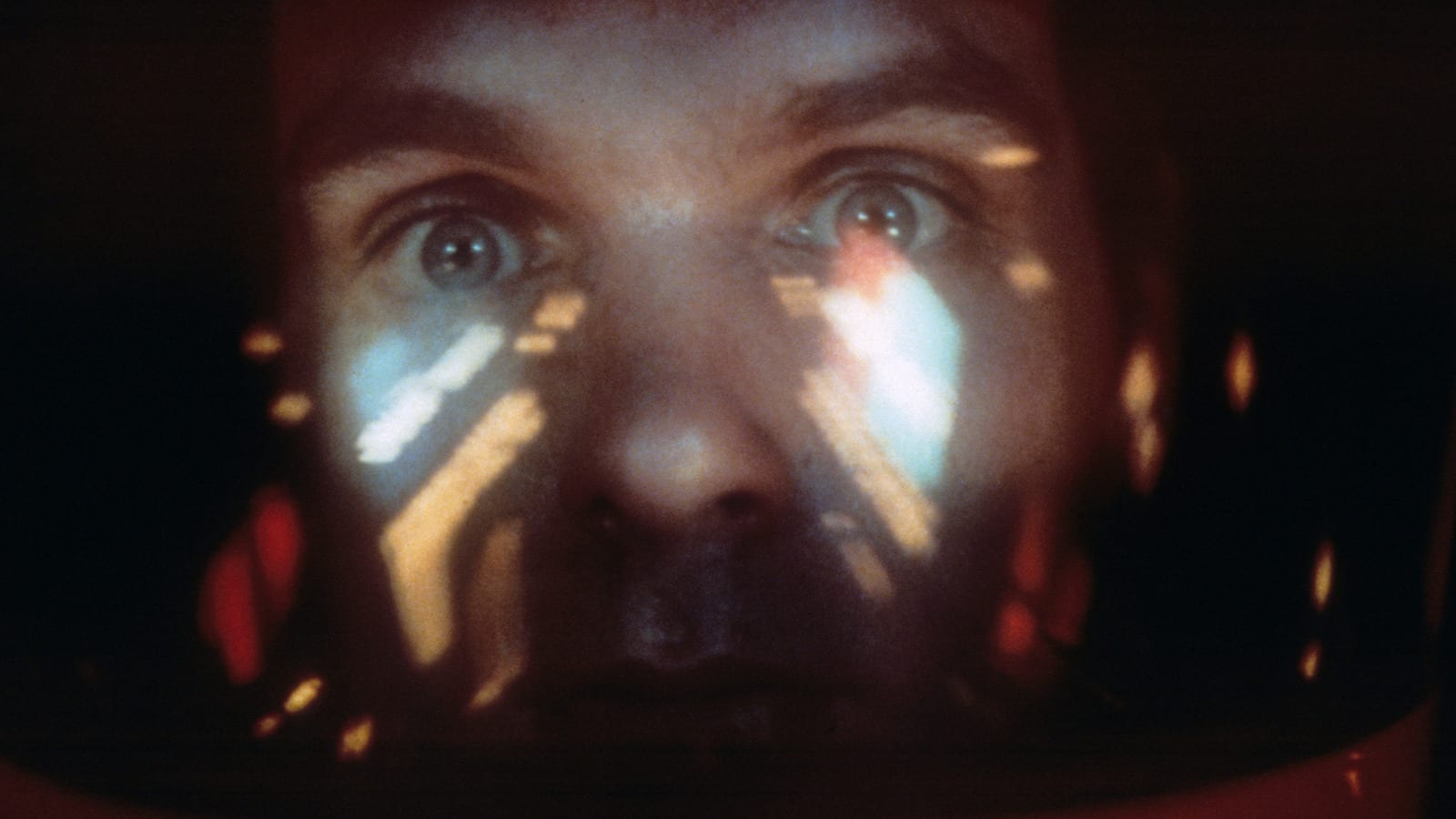
25 best films set in the future
If October's release of "Blade Runner 2049", proves anything, it shows that filmgoers can't get enough of futuristic films. Here's our list of the 25 best films set in the future.
Back to the Future, Again
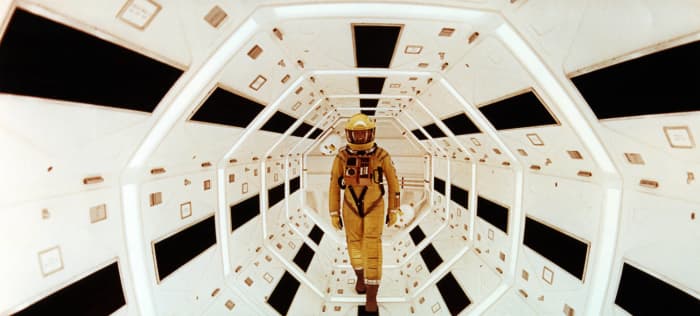
35 years ago, director Ridley Scott gave filmgoers a dark yet beautiful dystopia in "Blade Runner." This week, Scott, with the help of director Denis Villeneuve resurrects his cult classic in "Blade Runner 2049," the latest in Hollywood's love affair with futuristic sci-fi. To celebrate, here's our top 25 films set in the future. This is pure futurism, for better or worse, with no time travel or alternate timelines.
25: Soylent Green (1973)
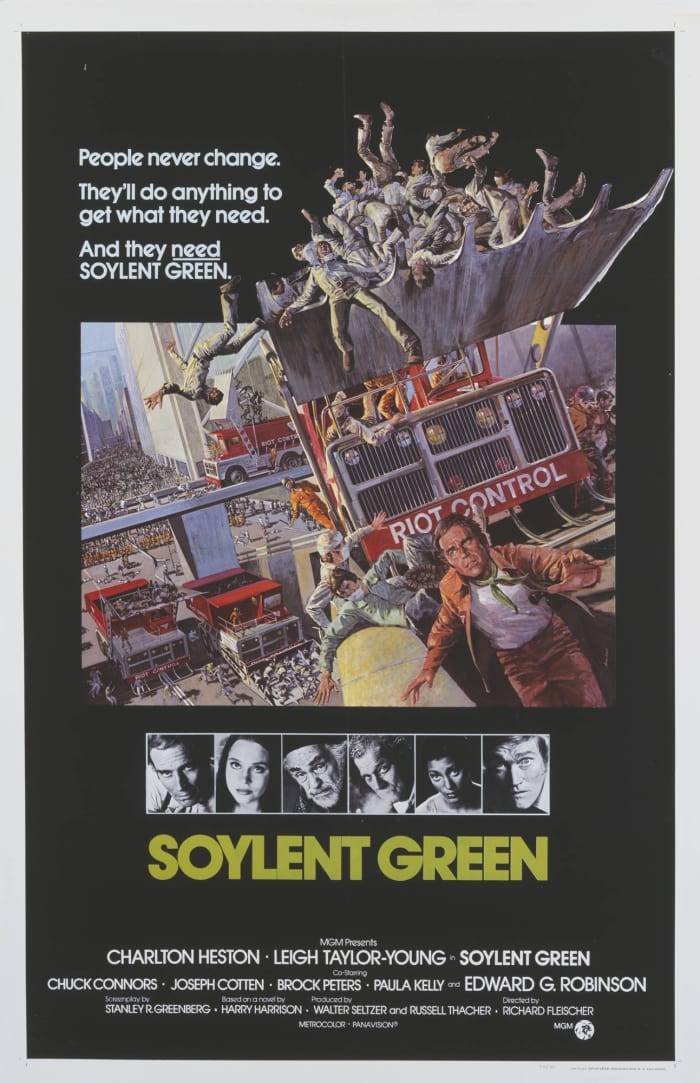
Loosely based on the obscure 1996 novel "Make Room, Make Room," "Soylent Green" is a film long-spoiled by its shocking conclusion turned into a punchline by comedians in the years since its original release. Despite that, the film features a solid performance from stoic overactor Charlton Heston as a cop in an extremely overcrowded New York City in 2022 crippled by famine, with only a mysterious green wafer serving as the line between nourishment and starvation. Edward G. Robinson makes his final screen appearance as Heston's friend and roommate.
24: Barbarella (1968)
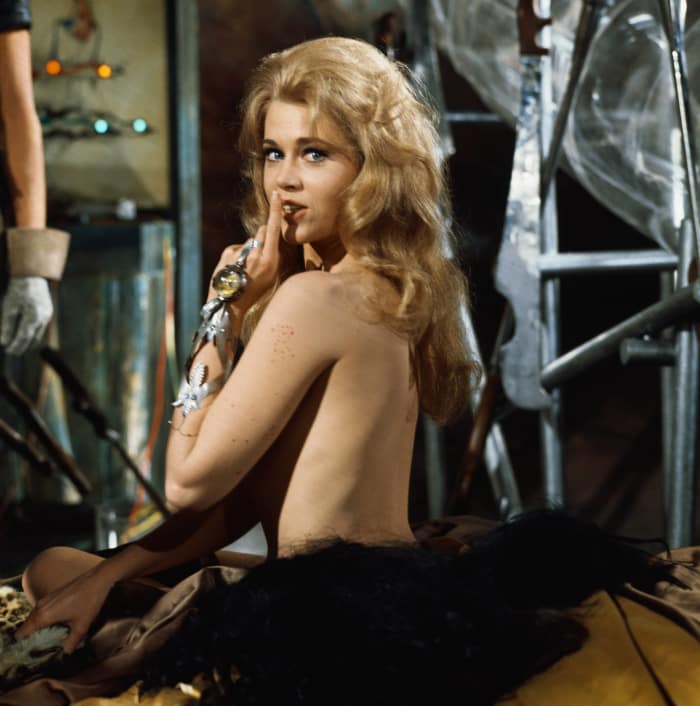
A surreal and sexy adventure set in an undetermined future, Roger Vadim's "Barbarella" was a showcase for a young Jane Fonda, who audiences got to see from practically every angle as she cavorted across planets with the aid of a blind angel, occasionally having "old-fashioned sex" and fighting her way out of Excessive Pleasure Machines with only her wits and a modicum of clothing. Based on a French comic book, "Barbarella" was definitely a product of its time, but never took itself too seriously with its psychedelic visuals and tongue-in-cheek humor.
23: The Running Man (1987)

Based on one of Stephen King's "Bachman Books," "The Running Man" comes across as a standard Arnold Schwarzenegger vehicle, featuring a dystopian America whose national obsession is "The Running Man," a gameshow featuring felons who have to fight their way through a gauntlet of hunters with the grand prize being their freedom. Set in 2017, given our current climate in the real 2017, this film feels a little too close to home as the villain show host (played by real-life game show host Richard Dawson) shares more than a few parallels with our current game show president.
22: Dune (1984)
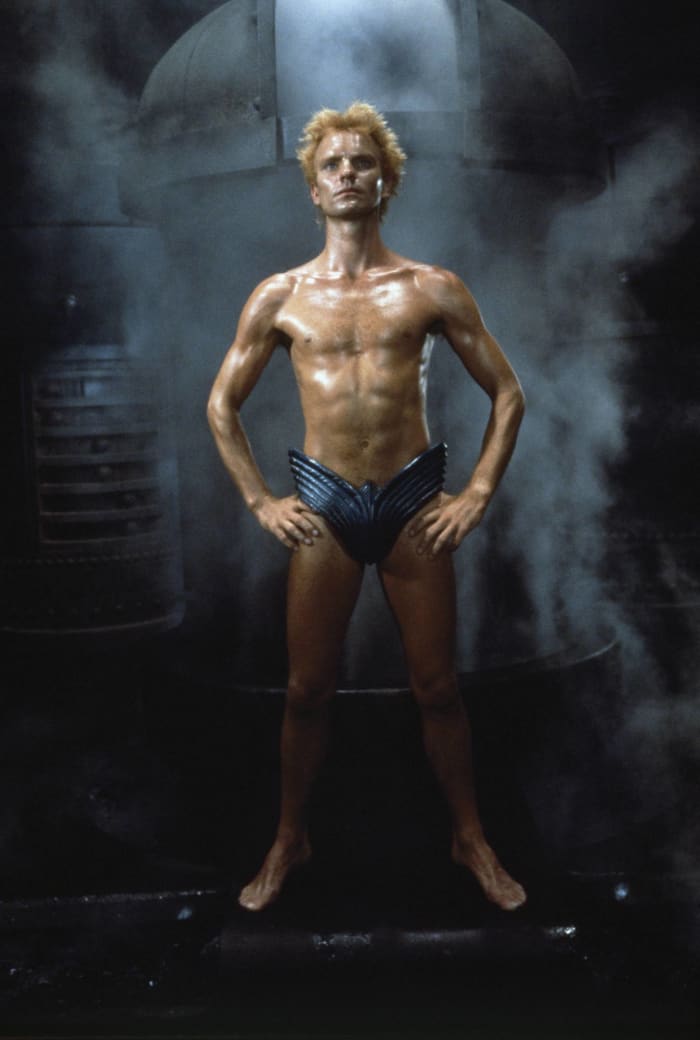
Depending on who you ask, David Lynch's highly-stylized adaptation of Frank Herbert's classic sci-fi saga "Dune" is either visionary or disastrous. In either case, Lynch's attempt to present a coherent story from the unwieldy pages of the book bring forth sumptuous visuals and strong performances, some bizarre and grotesque, as in Kenneth MacMillan's portrayal of Baron Harkonnen. Sadly, audiences never got to see Lynch's fully-realized version, as Universal took control of his edit, chopping the film down into something widely panned as the film ended up a box-office flop. Despite that, what remains, in its various pieces, merits a place on this list.
21: Dredd (2012)

Unlike the overproduced Stallone turkey "Judge Dredd" which flopped unmercifully out of theaters in 1995, the pared-down "Dredd" is an example of dystopia done right, as the titular Judge (Karl Urban) blasts his way onto the screen in what can be considered one part "Training Day" and one part "The Raid" as he shows a rookie (Olivia Thrilby) the ropes in what looks like a no-win situation... for the criminals. "Dredd," despite having a much lower budget than its previous incarnation, succeeds in giving fans a version of the character they've waited a long time to get, while also creating a film worth experiencing more than once.
20: Total Recall (1990)

The second Schwarzenegger vehicle to make the list, and the first of three directed by Paul Verhoeven, "Total Recall," based on the Philip K. Dick short story "We Can Remember It for You Wholesale," is a glimpse into a future where man can travel to Mars — that is, unless you'd rather have the memory implanted instead. The film is a standard actioner on one hand, but what sets it apart is the unease that comes from wondering what is real and what's just an implanted memory.
19: Starship Troopers (1997)

Based on Robert Heinlein's classic novel, director Paul Verhoeven uses his signature satire to elevate what is essentially a 23rd century war film into a subtle glimpse into our past as well as a nod towards a potential future. Verhoeven pulls no punches in depicting what is essentially a fascist future where citizenship is intrinsically tied to military service, in a way that heavily invokes Nazi imagery. Of course this is all on purpose, as Verhoeven draws a parallel between the perils of utopia and a right-wing fascist state the viewer is asked to root for as they fight a war against literal bugs.
18: Silent Running (1972)

Not all good futuristic films are set in a dystopia, as evidenced by director Douglas Trumbull's "Silent Running," a film about an ecologist (Bruce Dern) tasked with tending to both flora and fauna in a space greenhouse. "Silent Running" is certainly a more meditative and environmentally-friendly affair until the plants are threatened by destruction at which the ecologist turns avenger in hopes of saving vegetation no longer meant for Earth. The film is largely carried by Dern's performance, but is also lauded by those who are into more cerebral sci-fi.
17: Metropolis (1927)

Fritz Lang's silent masterpiece "Metropolis" has been through quite a lot over the years. A film ahead of its time, featuring special effects unrivaled in filmmaking, its epic 153 minute length caused audiences at the time to reject the story of a futuristic urban dystopia that seemed to some as an endorsement of communism, a serious problem in Weimar Germany. In more recent years, "Metropolis" found new life edited with a more contemporary soundtrack courtesy of Giorgio Moroder, which reignited interest in the film, leading to a full restoration of the original film and soundtrack in 2010.
16: A Clockwork Orange (1971)

Featuring a "near-future" dystopian vision of England, "A Clockwork Orange" is considered one of director Stanley Kubrick's finest efforts. The film centers on ultra-violent Alex DeLarge (Malcolm McDowell) and his band of "droogs" who wreak havoc everywhere they go until Alex is arrested and subjected to a new, sadistic therapy with the goal of "curing" him of his anti-social tendencies. Upon release, the film found its share of controversy, as critics decried elements of the film that bordered on pornography and a seemingly nihilistic attitude towards violence, anchored by a character without redeeming qualities. That said, it's McDowell's performance that solidifies "A Clockwork Orange" as a bonafide classic.
15: Sleeper (1973)

Woody Allen brings his own sense of irreverent humor to a different sort of dystopia in his only sci-fi effort, "Sleeper." Allen stars as Miles Monroe, a nebbish health food store owner who manages to get frozen against his will for 200 years, waking up in a future he barely recognizes while being chased as a man out of time. "Sleeper" is just as much a valentine to Marx Brothers-type madcap humor as it is a tongue-in-cheek jab at sci-fi concepts appearing in other films and novels.
14: THX 1138 (1971)

Before sending audiences to a galaxy far, far away, director George Lucas remade one of his student films into "THX 1138," a dark dystopic fable of a life purposely devoid of emotion and pleasure as all sex and reproduction are outlawed and suppressed through the use of psychotropic drugs intended to keep the masses sedated. Robert Duvall stars as the titular character, a man who finds himself on the run as a series of unfortunate events takes place throughout the film threatening THX and all his closest friends.
13: Aliens (1986)

How do you make a sequel to a sci-fi classic even better? Just add James Cameron. Some might blanch at the exclusion of Ridley Scott's original "Alien" in lieu of its more action-oriented sequel, but the proof is in the xenomorph pudding. Unlike the original, which stays aboard the doomed space freighter, "Aliens" succeeds in opening up the world in which the original was based, showing that the villains wearing three-piece suits are every bit as dangerous as the ones designed by H.R. Giger. Everything about "Aliens" is bigger and frankly better than its predecessor, giving it a fair home on our list.
12: WALL-E (2008)

A post-apocalyptic film with heart, Pixar's "WALL-E" is the story of a lonely trash compactor left behind on an abandoned Earth until he inadvertently finds love in the form of a robot whose goal is to find vegetation in hopes of recolonizing the planet. "WALL-E" is not just a cute love story set in a hopefully impossible future, but also a glimpse into the worst-case scenario of consumption as we see a used up Earth and a spaceship full of obese, atrophied humans who've given up on anything that isn't attached to a digital screen.
11: Akira (1988)

Katsuhiro Otomo's groundbreaking anime magnum opus is widely considered by many to be the greatest animated sci-fi film ever made, and they just might be right. Presenting a dystopic Neo-Tokyo rebuilt nearly 30 years after World War III, "Akira" is the tale of a group of friends whose friendship is tested to a breaking point when one of them develops psychokinetic powers, becoming a virtual god. "Akira" showcases themes and subject matter not often used, and it's done to great effect. Many future-based films and TV shows have tried to copy what made "Akira" unique, and to date, no one's come even close.
10: Minority Report (2002)

The second film on the list based on a Philip K. Dick story, "Minority Report," is the story of an entirely different way to apprehend criminals: by arresting them before they even commit the crime. The futuristic version of Washington DC maintains its natural look, benefiting from effects which are groundbreaking in their own right. The first film to have its production design be totally digital, the end result is a film whose CGI is unrecognizable from reality, allowing the viewer to totally immerse themselves in the film without believability being compromised. To date, it's director Steven Spielberg's best-looking film.
9: Blade Runner (1982)

Largely overlooked during its original 1982 run, this adaptation of Philip K. Dick's "Do Androids Dream of Electric Sheep" features Harrison Ford as a cop specializing in retiring "Replicants," or synthetic human beings. Everything from digital effects, set design and the Vangelis-composed soundtrack set "Blade Runner" apart from your normal sci-fi flick. Effectively giving off a neo-film noir sensibility, the performances —particularly that of Rutger Hauer's sympathetically sadistic replicant Roy Batty — give the film needed weight, elevating it above simple sci-fi fare. There are seven different edited versions of "Blade Runner," but none better than director Ridley Scott's 2007 "Final Cut."
8: Battle Royale (2000)

Kinji Fukusaku's "Battle Royale" is the book and film the "Hunger Games" series wishes it was. Set in a dystopic and authoritarian version of Japan, the film focuses on high school students who have to fight to the death in an annual game mandated by the government as a grotesque means of population control. Since making it to American shores, "Battle Royale" earned cult classic status, but not without first earning its own share of controversy. In Japan, the film was nearly banned after an 11-year-old schoolgirl murdered her 12-year-old classmate, later claiming "Battle Royale" as an influence.
7: Brazil (1985)

While not a direct adaptation of George Orwell's classic dystopian nightmare "Nineteen Eighty-Four," Terry Gilliam's "Brazil" is heavily influenced by it, delivering equal parts humor and a stark look at the absurdities that can be found in a world dominated by the horrors of never-ending bureaucracy. As with many dystopic tales with a bleak ending, the studio wasn't pleased and had the film re-edited into a shorter film reflecting a happier ending, famously known as the "Love Conquers All" edit. Gilliam fought for years to have his version available, which he succeeded in doing thanks to releases via the Criterion Collection.
6: 2001: A Space Odyssey (1968)

Stanley Kubrick's magnum opus interpretation of Arthur C. Clarke's novel is usually number one on most sci-fi/futurist lists, but despite the lower ranking, "2001: A Space Odyssey" remains one of the most influential sci-fi films ever made. Devoid of spaceship battles, laser guns or marauding villains, the film takes viewers on a more existential if not supernatural journey of humanity's place in the universe, from the dawn of mankind through the creation of a new form of life unknown to us before. Oh, and there's a murderous computer involved, just in case the existentialism was too much to bear.
5: The Fifth Element (1997)

Luc Besson gives viewers a colorful and hyperkinetic vision of the future in "The Fifth Element," casting Bruce Willis as a cab driver who is also the unlikely savior of Earth. Joining him in his adventure is an interestingly cast Chris Tucker as gender-bending heartthrob Ruby Rhod and Milla Jovovich as an alien superweapon who basically just wants to be loved. Everything about "The Fifth Element" is based in madcap fun, and while the setting of the film is dystopic by its very nature, who can have a problem with a film that cast Tiny Lister as the president?
4: The Road Warrior (1981)

Of all the "Mad Max" films, none hits as hard or looks as good (sans CGI) than George Miller's original sequel. While "Mad Max" featured a dystopic version of an Australia falling apart, 'The Road Warrior' is full-blown post-apocalyptic. Mel Gibson says very little as the burned out Max Rockatansky, but his ability to endure punishment throughout the film is a hallmark for the character and set a tone for post-apocalyptic future westerns that was copied by practically else.
3: Star Trek II: The Wrath of Khan (1982)

Possibly the only film on our list that isn't set in a dystopic future, "Star Trek II: The Wrath of Khan" makes its bones by feeling like a bit of a throwback. Even though the stardate is far into the future, director Nicholas Meyer's choice to make a futuristic version of "Horatio Hornblower," with nautical battles at sea replaced with a game of cat and mouse in a nebula, hits all the right tones, and even though it's just another "Star Trek" film, it's a rousing one with stakes much higher than what not only the franchise is used to, but also the genre itself.
2: RoboCop (1987)

Director Paul Verhoeven's third entry on our list is also by far his best. "RoboCop" is set in a decaying Detroit of the not-so-far-off future, destined to be destroyed and rebuilt as Delta City by the all-powerful Omni Consumer Products, or OCP. Violent crime is decimating law enforcement, so the natural solution, of course, is to build a robot, but in the process create a hero. "RoboCop" succeeds so well because at its heart, it's just an old-school western with a sheriff who has a soul. Verhoeven mixes satire with a healthy dose of gore to create a one-of-a-kind experience that he's so well-known for.
1: Planet of the Apes (1968)

The number one film on our list is set in the future, but looks like it's carved from our past. There are no spaceships or lasers or robots to be found, but there are plenty of damned dirty apes. Adapted from Pierre Boulle's "La Planète des Singes," "Planet of the Apes" is a nightmarish journey into an upside down world where ape is greater than man, and a secret which shocked audiences almost 40 years ago, and yet still bears a similar impact today. The film is the perfect dystopian nightmare, a launching pad for good sequels and an even better reboot series, and also a showcase for Charlton Heston's perfectly tortured caterwauls, including classics like, "It's a madhouse!" and "You blew it up!"
More must-reads:
Trending in Entertainment
Customize Your Newsletter
 +
+
Get the latest news and rumors, customized to your favorite sports and teams. Emailed daily. Always free!
Use of this website (including any and all parts and
components) constitutes your acceptance of these
Terms of Service and Privacy Policy.

